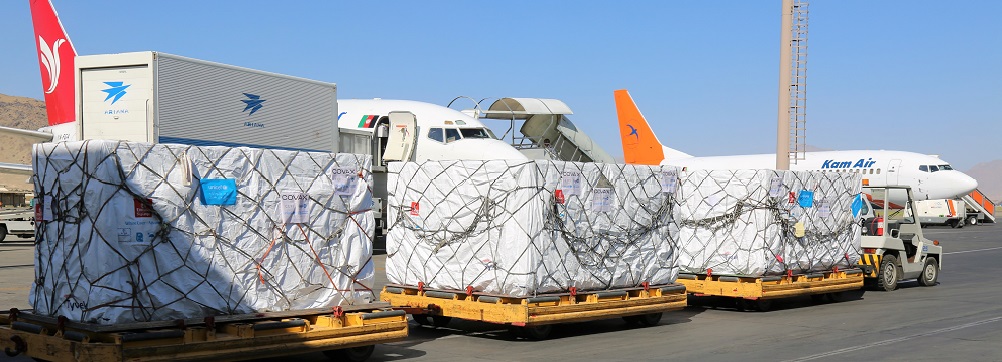
Kabul, Afghanistan, 9 July 2021 – Today, Afghanistan received 1.48 million doses of Johnson & Johnson vaccine through the COVAX Facility.
This delivery is the first of 2 shipments of a total of 3 312 100 doses of Johnson & Johnson vaccine allocated to Afghanistan through the COVAX Facility, with the remaining doses set to arrive later this month.
The shipment of vaccine received today comes in addition to the first batch of 468 000 doses of the COVISHIELD (AstraZeneca) vaccine, delivered in March 2021 through the COVAX Facility, a partnership between CEPI, Gavi - the Vaccine Alliance, UNICEF and WHO.
“This shipment comes at a critical time when the country is experiencing a third wave and a continuous rise in COVID-19 cases. The doses received will be vital in boosting and scaling up Afghanistan’s ongoing COVID-19 vaccination programme led by the Ministry of Public Health,” said Dr Irfan Akbar Elahi, Officer In Charge, WHO Afghanistan.
Ensuring the safety and effectiveness of vaccines remains a prime focus for WHO. The Johnson & Johnson vaccine, which is a single dose vaccine, has been approved for emergency use listing by WHO and has already been rolled out in various countries. “We urge everyone to vaccinate to keep themselves and their communities safe. Vaccines are a key tool for stopping the spread of COVID-19,” said Dr Elahi.
As a one-dose vaccine, the Johnson & Johnson vaccine will be helpful in facilitating logistics in Afghanistan, particularly in hard-to-reach areas, by reducing the need for a follow-up dose.
Since March 2021, more than 909 829 people have been vaccinated; 720 982 individuals have received the first dose of the vaccine, and 188 847 have received 2 doses. Apart from vaccines delivered through the COVAX Facility, Afghanistan has also received 500 000 doses of the AstraZeneca vaccine donated by India and 700 000 doses of Sinopharm donated by China.
WHO lauds the efforts of the Ministry of Public Health for gradually expanding the COVID-19 vaccination programme. However, due to limited vaccine availability, the vast majority of Afghans remain unvaccinated. The longer it takes to vaccinate everyone, the longer the risk of sustaining COVID-19 and potential variants to emerge.
“Ensuring equitable access to vaccines is critical for ending the pandemic everywhere and for this Afghanistan needs the continued support of the international community. The arrival of vaccine donations is a step in the right direction. But to really turn a corner in the fight against COVID-19, more is needed to ensure everyone, including the most vulnerable groups, can be protected,” added Dr Elahi.
WHO, together with UNICEF, will continue to support the Ministry to safely and equitably administer vaccinations across Afghanistan.


